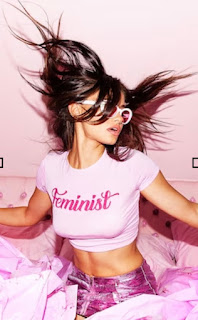The Dichotomy of Fast-Fashion and Feminism
By Serena McKenzie
In March this year, Fairtrade International noted that 80 percent of textile workers are women, with a disproportionate number living in poverty despite working in a 1.53 trillion-dollar fashion industry. However, the issue lies in their invisibility; your average consumer of fast fashion won’t realise that their sequined, embroidered or crochet garments were hand sewn by a woman ‘in her own home, working without a contract or social protection’. In South Asia, a staggering 50 million women work at home in the textile industry. They are isolated, silenced, and have no protection by labour law so they are very rarely able to assert their rights and escape this vicious exploitation. According to the Clean Clothes Campaign, female textile workers in India and Bangladesh receive wages of 2 to 5 times less than the amount a worker and her family need to live with dignity. Indonesian female factory workers suffer verbal and physical abuse and sexual harassment, and many are threatened with termination if they don’t engage in sexual relations with their male managers. Abuse is inescapable and inseparable from a working life; if they don’t accept this reality then they risk unemployment. So, the question remains: can you call yourself a feminist if your fast fashion “retail therapy” comes at the expense of another woman’s welfare?
We can also see a huge hypocrisy where fast fashion brands have promoted feminism, embossing garments with socio-political slogans which “champion” female empowerment. Pretty Little Thing has been guilty of this double standard on numerous occasions and has not yet learnt its lesson. For example, listed currently on their website is a pink “Feminist” t-shirt; the item’s description reads ‘Show em' who rules the world girl with the bang on trend Feminist slogan T’. Perhaps Pretty Little Thing should peel back their “empowering” slogans to expose who don’t in fact ‘rule the world’ but instead suffer immense exploitation: according to the Sunday Times 2020 investigation the women who produce these clothes were earning only £3.50 an hour in one Leicester factory which supplies the company. If Pretty Little Thing view feminism as merely a profitable ‘trend’ then they have missed its entire message of advocating women’s rights, especially those of the marginalised women working within their own company.
We can even witness fast fashion brands capitalising on women’s rights on International Women’s Day, publishing feminist statements which appear to lose their impact when we observe their sheer disregard for the unjust treatment of the women making their clothes. On International Women’s Day 2020, H&M posted a video on Instagram captioned, ‘we’re taking a stand for gender equality and encouraging others to follow our lead’. They are certainly taking a step in the right direction as ‘7 out of 10 leaders at H&M are women’, yet we mustn’t turn a blind eye to the reports published by Global Labour Justice which reveal the gender-based violence across their factories in Asia which includes rape, slapping, and restriction from taking bathroom breaks amongst other forms of abuse. The US director of Global Labour Justice, Jennifer Rosenbaum, stated “H&M and Gap’s fast fashion supply chain model creates unreasonable production targets and underbid contracts, resulting in women working unpaid overtime and working very fast under extreme pressure.” So, why is it that H&M’s strong stand for feminism doesn’t extend to their own workers? Writer Andi Zeisler coined the term ‘marketplace feminism’ in her book We Were Feminists Once, referring to a new branch of depoliticised feminism which is consumer-centred and undermines the strive for gender parity which women have been working towards for years. If fast fashion companies like H&M really prioritised ‘gender equality’ then they would be monitoring the treatment of women at all levels in their production; what we see all too often is rather a ‘marketplace feminism’.




Comments
Post a Comment